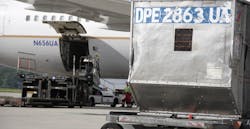The European situation with respect to the liability of ground service providers in relation to the disruption of airline services is very peculiar as airlines are faced with diverging requirements they need to abide with. From the one end airlines need to comply with European Union regulation 261/2004 which was enforced to protect consumers against flight disruptions caused by the lack of capability of operating carriers to transport a passenger booked on a certain flight. From the other end ground service providers accept liability for ground damage events up to USD $1.5 million for wide-bodies and normally up to USD $750,000 for narrow-bodies but only for the physical damage and not for consequential losses, in conformity with Article 8 of the IATA standard ground handling agreement (SGHA).
A burden on airlines
“EU 261 is valid for passengers departing from an EU member state or traveling to an EU member state on an airline based in an EU member state, says Ivar Busk, an aviation insurance consultant. "The compensation paid depends on various conditions: distance and delay are the main factors determining the amount to be paid. Besides the compensation, accommodation, meals, etc. should also be paid directly to the passenger. The cost burden is always absorbed by the operating carrier and today there is no way for it to be reimbursed by other suppliers that might have caused the disruption in the first place. The compensation varies from EUR 250 to EUR 600 depending on the distance of the flight. Often the delay or cancellation is caused by a suddenly arising situation and therefore difficult to prevent for an airline.”
According to Sean Gates, an aviation lawyer, EU 261 imposes costs and expenses on airlines for delays and cancellations and severely limits their right to defend such claims. “EU 261 is accordingly a very significant burden on airlines operating within Europe. To the extent delays are caused as a consequence of ground handling incidents where the ground handlers are able to take advantage of Article 8 of the SGHA, there is an argument that the ground handlers are exempt from responsibility particularly for claims pursuant to EU 261,” he says. “However, the position varies from one country to another within Europe and care must be taken to examine the actual exposure of handlers before deciding not to pursue them for damages.”
“EU 261 reserves the right for airlines to look for compensation from third-party suppliers such as airports, handlers, ATC, etc., if they are responsible for cancellations or delays. We are not aware of this right having been used so far,” clarifies Bob Schmitz, legal counsel of the Airport Services Association (ASA) for European regulatory issues.
According to Gates, “There is no doubt that both EU 261 and SGHA Article 8 provisions are ‘anti airline’, even though the SGHA is nominally a product of IATA.” Busk says that since EU 261 was implemented a number of judicial cases have occurred within EU member states and so far the known cases have been judged in accordance with the EU Commission interpretive guidelines on EU 261. “But seen from an airline point of view the guidelines are going too far when it comes to the airlines’ efforts to prevent delays or cancellations caused by extraordinary circumstances which could not have been avoided even if all reasonable measures had been taken,” he explains.
Article 8
According to Martin Meyer, an IATA Ground Handling Council (IGHC) officer and a member of IATA’s Aviation Ground Services Agreements (AGSA) task force, since Article 8 was added to the SGHA and the GSPs accepted a limited liability for physical loss, it has always been a discussion point to increase this limitation. “This has come up from AGSA members representing airlines or from airline risk assessment professionals raising the argument that the total damage for the airline is much higher than physical or direct loss. That was when we started to talk about consequential losses, meaning the additional losses which airlines bear,” he says. “The AGSA task force has taken all these change requests on, but up to now has always come to the conclusion that it is best for the industry not to change Article 8.”
Busk believes that the discussion on the repayment of consequential losses, namely those arising from the requirements of EU 261, to be incorporated in the SGHA is a valid point. “Should this type of compensation be paid in accordance with an update to Article 8 of the SGHA? The argument already brought on the table will come up again, and that is that the handling fees need to be increased accordingly,” he says.
Gates is of the opinion that “if airlines could recover from handlers, this would improve their bottom line. It should not lead to an increase in handling charges since claims against handlers are covered by insurance and insurance premiums do not go up until after a claims experience of several years has been established. It is suggested that airlines can insure for consequential losses but this is true only to a limited extent of a few hundred thousand dollars. A significant incident can lose an airline millions which they have to absorb themselves or die. In effect they are required to be the insurers of the often much larger and always more profitable handlers. In addition, the proper response of course would be to improve the quality of the handling agents,” he explains.
Samim Aydin, chairman of ASA, believes that EU 261 and passenger rights issues are “the real Pandora’s box that ground service providers will never accept opening especially in respect of the right to redress and what is a regular and an irregular course of operation. We had many meetings with European Community officials trying to explain,” he says. “The right to redress might or will reopen the issue of ‘consequential damage claims’ which is a no go from the side of handlers, as no one can calculate, guess or predict the ‘consequential damage part’ which makes insurance premiums go to the sky; this is why we have the indemnity limits in the first place.”
“Of course, what we call consequential losses could be insured by the airlines, or if we shift the liability toward the GSPs, then they could be insured by the handlers. However, the airlines choose not to insure this part of the risk, as it is much more cost efficient. If the risk were on the GSPs’ side, the handlers would have no choice but to insure that risk. This will in our view increase the total cost,” explains Meyer.
While amendments to SGHA Article 8 have been discussed for a long time and not changed, the industry has however committed to improve ground handling safety. “Instead of just shifting liability we started to focus on improving ramp operations to prevent accidents. Initiatives such as IGOM and ISAGO are the result of this effort together with the introduction of quality and safety management systems,” says Meyer.
Revision of EU 261
If from the one end Article 8 of the SGHA does not appear likely to be altered anytime soon, from the other end, says Gates, it is also highly unlikely that EU 261 will be made less of a burden for airlines.
Earlier in 2016 the European Commission published interpretative guidelines on EU 261. The document does not recognise that the collision of mobile boarding stairs with an aircraft can be considered as ‘extraordinary circumstances’ exempting an air carrier from payment of compensation under EU 261. Schmitz points out that the interpretative guidelines state that “mobile stairs or gangways can be regarded as indispensable to air passenger transport, and therefore air carriers are regularly faced with situations arising from the use of such equipment. A collision between an aircraft and a set of mobile boarding stairs is, hence, an event inherent in the normal exercise of the activity of the air carrier.” He believes that this could be interpreted as meaning that collisions causing flight delays or cancellations are a regular and normal phenomenon in air transport, which – he notes – is fortunately not the case.
Schmitz furthermore notes how the interpretative guidelines stress that “extraordinary circumstances would apply, for example, when damage to the aircraft is due to an act external to the airport’s normal services, such as an act of terrorism or sabotage.” He believes that by denying accidents occurring during normal airport operations the qualification of extraordinary circumstance EU 261 discourages care in the supply chain as it cannot be invoked to limit the financial liabilities of airlines toward stranded passengers.
Concerning the revision of EU 261, the main effort of ASA has been to overturn the proposal whereby damage caused on the ground may qualify an extraordinary circumstance – meaning no financial compensation for passengers – if caused by third parties for whom the air carrier, in the absence of contractual relationships, is not responsible on the ground prior to departure of the flight and requiring immediate assessment or repair. “ASA’s recommendation has been to refer more broadly to ‘damage to the aircraft caused by non-controlled third parties on the ground.’ This wording should allow damage caused by independent contract and non-contract handlers to qualify as extraordinary circumstances, as carriers do not exercise decisive control over independent handlers, not even those with whom they have a service contract,” says Schmitz. “Unfortunately our recommendations are not reflected in the interpretative guidelines.”
The revision of EU 261 is stuck at EU Council of Ministers level and even if unblocked one day, it is unlikely that the current passenger compensation rights will be reduced, because of the European Parliament, says Schmitz.
A wider issue
According to Gates, European airlines are facing the burdensome effects of EU 261 also for delays caused by other suppliers such as airports and ATC. “Even these instances are not regarded as extraordinary, so airlines have no defence,” he says. There are indeed many cases which actually are outside the responsibility of airlines, e.g. delays or cancellations caused by bird strikes, lightning strikes or ATC, according to Busk. “These are also considered as cases of non-extraordinary circumstance and therefore requiring compensation to be paid in accordance with the regulation,” he says.
Should compensation be paid by third parties, the procedure will need to be more clearly defined by the European Commission, says Busk. “In addition, the definition in the regulation of what is within the actual control of the carrier is not clear and is subject to litigation in my European member states. Due to this situation the Commission has proposed several revisions to the regulation which will hopefully clarify the situation,” he concludes.



